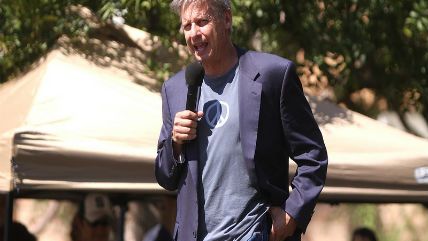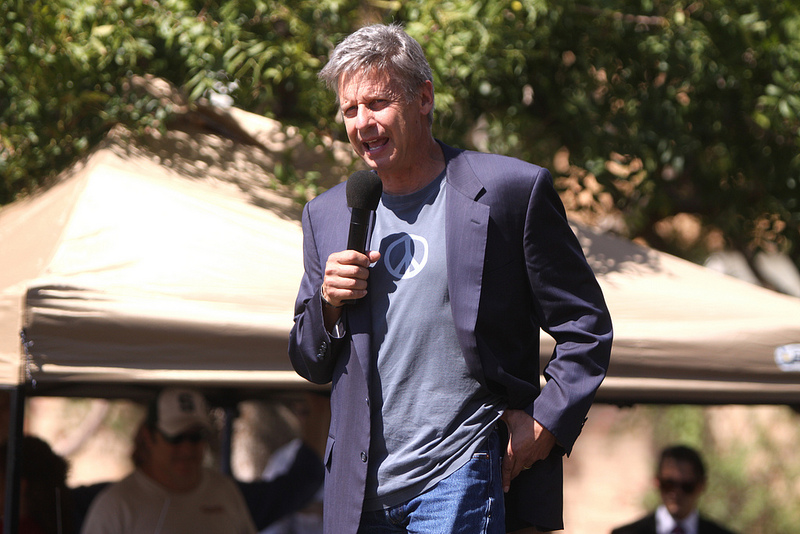Libertarian Candidate Gary Johnson Says Gun Restrictions Make Us Less Safe
Gun free zones and providing free recruiting services to ISIS by overly crediting Orlando shooting to foreign terror both condemned by Gary Johnson in interview this morning.

"I understand how so many people can believe that if you restrict this kind of weapon you can prevent this kind of incident," said Libertarian Party candidate Gary Johnson in reaction to the murders in Orlando and the political calls to further restrict access to certain guns that arose after the shooting.
"But there's just no evidence whatsoever to suggest that it makes us any safer, and in fact restricting guns makes things less safe, that's the camp that I'm in," he said in a phone interview this morning.

Johnson went on to consider Switzerland, where most adult males are part of a trained militia and have weapons in their possession, and has a lower gun crime rate than America.
Johnson falls into the same camp as Donald Trump on the issue of more guns in citizens' hands being a potential solution to such incidents, though Johnson seems to be thinking through the issue out loud, with due consideration to contrary arguments, rather than sounding a kind of NRA-level certainty about it.
"If everybody in that nightclub had a weapon?" he wonders. "The contrary argument is, if everyone were required to have a weapon or if 50 people in the room had a weapon, you could hear arguments, well, people in a nightclub would be drinking and now all of a sudden they've got a gun in their pocket?"
But he ultimately concludes that "if it were that 10 people who could have had a weapon in that nightclub? That ultimately would have made the situation less horrific than it ended up being. I'm in that camp."
He notes how many of these incidents, like the Colorado theater shooting, "happen in gun free zones, all these places where horrific shootings happen are all gun free." Johnson praised a Libertarian Party press release calling for an end to gun-free zones. Johnson is fully aware of the cultural push against such thinking—"people hate to hear it, they just hate to hear it…antigun people they just feel, ooo, disgust when you start talking about, 'well this was a gun free zone, so that means the bad guys'" have free rein—but Johnson does think more legal restrictions on guns are not only not helpful, but often harmful
Johnson does not consider himself personally or culturally a "gun guy" but he did grow up hunting and "in the last six years I now own a couple of guns and it's for personal protection, the notion that, holy cow, what if there's a situation at my rural home in New Mexico and there is not a way to protect" himself, his property, or his loved ones.
When it comes to the terror and foreign policy implications of the Orlando shooting, Johnson says that "I think our initial statement on it is turning out to be pretty prophetic, which is don't jump to conclusions."
Johnson uses an extended analogy about streakers at sports games to discuss how he thinks American government and media should handle loons who claim to be furthering ISIS's goals without any proof of actual connection or communication with actual ISIS. "If we see it, that encourages others to do the same."
So just as he thinks turning TV cameras away from streakers discourages streaking, he thinks that overly harping on such crimes as acts of ISIS linked domestic terror is mistaken because as far as we now know, "they didn't recruit him, other than a blanket statement [calling on people] to pledge allegiance to ISIS and do dirty dirty deeds."
Thus Johnson fears it is "aiding recruitment to ISIS," to act as if Mateen was in any real sense their agent. He critiques the likes of "Fox News, Bill O'Reilly, Sean Hannity" trying to connect the dots to make this domestic crime something that's really about overseas terror. Johnson thinks behaving as if this crime is in a real sense an ISIS blow to America only aids ISIS recruitment.
The reality, he thinks, is that ISIS is "very regionalized" and that they don't seem to actually currently "have the resources or ability to expand geographically. On their part, they say [to radicals around the world], look, we need you as member of our army, but don't come to us, just do your thing and acknowledge ISIS" as complicit in their crimes. He thinks every time America acts as if "they are the enemy and need to be destroyed" we might just be helping this regional problem recruit and cause more harm to America than they'd otherwise be able to.
Johnson's running mate William Weld told The Washington Post that he thinks better domestic law enforcement might be a solution. Weld drew on his experience as a prosecutor to hype more delving into finding informants in relevant communities where domestic terrorists might lurk. Such expedients helped bust organized crime in the northeast, Weld says. He also was critical of the FBI for letting a guy who they had interacted with at least twice walk free to eventually commit all these murders.
While Johnson told me that he and Weld are currently not coordinating their particular talking points or solutions, he says he too wonders if maybe there was some specific "breakdown" in law enforcement practice, "given that we interviewed the guy…there potentially is something missing in the equation." He stresses though that he only knows that "potentially" there could be a law enforcement way "to address this same kind of situation going forward" but that he will always be "a level head when it comes to the nuts and bolts of how to proceed."
But Johnson said a solution, a la Weld, of a stronger domestic investigatory task force is preferable to "putting boots on the ground, dropping bombs, and flying drones" in response to terror threats.
Johnson even acknowledges that Weld, given his east coast and prosecutor's background, is more apt to see intelligent law enforcement as the best solution, "so Bill Weld may have reservations about me saying, 'Where are the 10 people who may have been armed?' but that's me, that's the west coast" mode of thought.
But Johnson grants that Orlando and San Bernardino represent a "new phenomenon, and maybe a new mechanism" of law enforcement might be needed for it, though he grants he doesn't know enough about the particulars to make a comprehensive statement of what that might be. "But that's why I'm running for president, something I really enjoyed about being governor of New Mexico: the ability to get in the middle of [such government process questions] and be a value added," one that starts from a perspective that less government can often be a better solution than more.
But Johnson does want the American people to understand that "you cannot categorically prevent anything like this from happening again" with any combination of immigration or law enforcement or sensible foreign policy.


Show Comments (116)